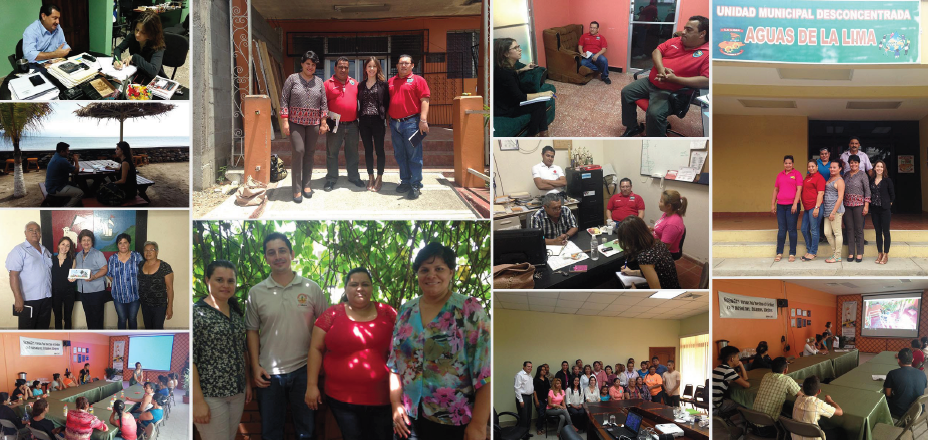MADE Pilot Fund and evaluation subject
Between 2015 and 2016, MADE implemented a seed fund in 6 field locations in Africa, Latin America and Asia, supporting small projects selected and coordinated in collaboration with MADE regional partners. A co-funding was provided to civil society organizations lobbying at the local or regional level, helping them move advocacy and visibility actions forward, in order to improve the conditions of migrants and the communities in which they live. In Latin America, MADE Americas partner Fundación Scalabrini (member of the Scalabrini International Migration Network) selected the projects of Asociación Centro Internacional Para las Protección de Los Derechos Humanos de las Personas Migrantes (ACIDEHUM) in Costa Rica and Comisión de Acción Social Menonita (CASM) in Honduras.
Fundación Scalabrini undertook field visits in June 2016 to evaluate the impact of the advocacy efforts lead by CASM with their project “Gobiernos Locales Incorporando Acción de Prevención y Reinserción de Migrantes” (Local governments implementing actions for precaution of irregular migration and reintegration of returning migrants). CASM’s project was selected for the evaluation because of the clearness of its objectives, activities, stakeholders and expected results, but also because of the emphasis on the participation of local governments since local authorities are typically the first responders to migration issues in the region.
In the beginning of June 2016, Fundación Scalabrini’s Programme Consultant Gabrielle Parenteau visited 6 municipalities of the Valle del Sula region to conduct interviews and collect ideas, testimonies and experiences from the local governments, civil society representatives and other relevant actors in relation to CASM’s project activities.
Overview of the evaluation procedure
The overall aim of the assessment was to monitor and measure the relevance and impact of the project while identifying challenges and successes during the process.
The evaluation was conducted taking into account the two main activities of the project:
- Subject: “Letter of Commitment” signed by 8 local authorities and 10 civil society representatives which formulates the basis of collaboration between the different stakeholders and describes the areas of cooperation between the local authorities and civil society
Measurement: Interviews with civil society actors as well as mayors or other representatives of the 6 municipalities in Valle de Sula, monitoring the implementation of the different commitments expressed in the Letter.
- Subject: Awareness-raising campaign on irregular migration with testimonies of returning migrants, featuring radio spots, posters and videos
Measurement: Interviews with focal persons who are either returned migrants themselves or individuals subject to a risk of irregular migration; interviews with radio moderators involved in the campaign
Results
- There has been an effective and measurable impact on the commitment of local governments to protect the rights of returned migrants
- Regarding irregular migration, a lack of cooperation between different levels of government could be noted. CASM’s project could indeed contribute to a necessary awareness-building and empowerment of local authorities
- International cooperation agencies have provided efficient humanitarian assistance to returned migrants but also created a dependence by doing so; CASM’s project trained municipalities as the primary actors to manage migration issues
- Important additional factors to take into account could be identified, such as the lack of support for vulnerable groups like family members of disappeared migrants
- An imminent conflict could be recognized between the need to prevent and raise awareness on irregular migration vis-à-vis many cities widely financially dependent on remittances
- Despite a favorable disposition to collaborate and commit, there haven’t been concrete follow-up actions on the letter of commitment. This originates not only from the scarcity of financial resources on both sides but also from the lack of knowledge sharing and transparency among the municipalities
- Many municipalities are divided in their views and badly informed on activities on the central government; More commitment from central government side is unanimously demanded
- The media play a crucial role in forming the mindset of young people whose motivations to emigrate have largely shifted from ‘pull’ factors to ‘push’ factors.
Recommendations for civil society
- Add concrete, measurable aims, indicators and expected results to the letter of commitment
- CASM should act as a constant monitor, frequently following up with local governments on the state of implementation
- With the support of the media, reinforce awareness-raising and information sharing on irregular migration
- Organize trainings on fundraising and project creation
Recommendations for local governments
- Formalize civil society participation in municipal processes
- Ensure knowledge sharing and transparency among municipalities and with civil society
- Acknowledge needs of vulnerable groups such as families of disappeared migrants
- Reinforce the development of a national Action Plan, guaranteeing access to data, collaboration with and inclusion of local governments, joined definition and implementation of migration policies
Read the full evaluation report (in Spanish)
Watch the clips of the campaign (in Spanish)
Photo collage by Fundación Scalabrini
